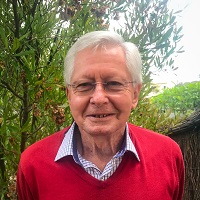Dr Donald Stammer

Banker, teacher, communicator: UNE alumnus Dr Donald Stammer has used his training in Economics to serve the discipline in a range of ways, while making important contributions to other fields like international relations and conservation.
Dr Stammer is a living rebuke to George Bernard Shaw’s quip, “Those who can, do; those who can’t, teach”. He is one of the latest recipients of a UNE Honorary Doctorate.
The boy who would become Deputy Chief Manager of Australia’s Reserve Bank grew up in the Hunter Valley, overly familiar with adversity. His family environment was shaped by two world wars and the Great Depression. His mother died of tuberculosis when he was five. The disastrous 1955 floods that swept down the Hunter Valley damaged many already fragile livelihoods and prevented him from attending high school after his primary schooling at the one-teacher Vacy school. The inability to attend high school would not have been a problem for earlier generations of his family: Dr Stammer was the first in his family to do so. Recognising his aptitude, friends of Maitland High School’s headmaster paid to secure a place for him in the school’s hostel.
He rewarded his patrons’ faith by becoming dux of the school and winning a scholarship to go up the hill to the University of New England, where he studied from Wright College.
He graduated with a UNE Economics degree in 1962. On graduation day, Dr Stammer’s father was in a car accident. His father died of his injuries several weeks later.
Dr Stammer accepted an invitation to stay on at UNE as an Economics tutor, and undertook his Master of Arts at the same time. It was the first step in a career that has freely intermingled work, teaching and learning.
He has been an investment banker: nine years as Deputy Chief Manager of the Reserve Bank; a decade as Director of Investment Strategy at Deutsche Bank; director of ING Australia for four years and non-executive chairman of Praemium Limited for nearly seven years.
He has taught: lecturing on economics and finance at UNE, the University of Hong Kong and the Australian National University (where he earned his doctorate). He was a visiting professor in the MBA program of the Australian Graduate School of Management at the University NSW.
He has taught in other ways, too. Until 2001, Dr Stammer made a weekly broadcast on the Australian economy and share market for the BBC World Service, and he contributed a regular column to a Japanese financial newspaper. From 1987 to 2006, he contributed a fortnightly column on the economy and investments to the Business Review Weekly and he now contributes a fortnightly column on investments for The Australian.
And there have been other forms of service. He has been on the board of Kaplan Higher Education Pty Limited; a director of the Sustainable Investment Research Institute; sat on the board of Australian Ecosystems Foundation Inc (and is now a life member); chaired the Blue Mountains World Heritage Institute, and chaired Earth Sanctuaries Limited, a wildlife and nature preservation company.
Looking back at the prospects of the Vacy boy he once was, Dr Stammer says he is surprised at what the world has offered him. He reflects with lasting gratitude that it was his teachers – at Vacy, Maitland, UNE and ANU – “who gave guidance and motivation to a boy who was prepared to work hard and who seemed to pick things up fairly quickly but had little idea of the benefits of a sound education”.
The education those teachers gave him in turn provided him with the credentials for motivating work. Reflecting on the fortunes of earlier generations, he also acknowledges that luck played a part.
“My generation was particularly fortunate; jobs were available, and moving from one job to another was relatively easy. By contrast, our parents’ generation, born in the early years of the twentieth century and many of them affected by two world wars and the Depression, had it tough.”
After a long period of prosperity and opportunity, conditions may prove to be more challenging for upcoming generations. Dr Stammer is optimistic that opportunity still flourishes.
“There are widespread opportunities for people of all ages to help make the world a better place: to leave a better environment, to improve education and health services, and to make it fairer,” he says.
“But recognise the many complexities and shades of grey, avoid populism and simple solutions – and be generous in giving your time and money.”
Dr Stammer’s reach has extended far beyond UNE to the world. He has made a lifelong impact on his students he has taught, the companies he has advised and on the readers of his columns. He will receive his UNE Honorary Doctor of Letters honoris causa (HonDLitt) at a future graduation ceremony.

